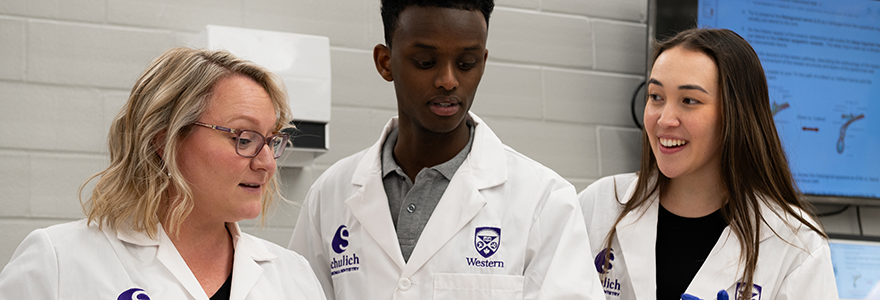MD admissions changes improve pathways into medical school

By Cam Buchan
Against a backdrop of a national doctor shortage, Schulich School of Medicine & Dentistry is introducing key changes to improve pathways into the MD program for qualified applicants.
Starting with the application process that begins this July for the 2025 academic year, future physicians applying to the School’s MD program will have the option to begin their medical journey a year earlier. This means prospective students will be able to apply to medical school while in their third year of a program that leads to a four-year undergraduate degree at a recognized university at the time of application – a full year sooner than the School’s MD admissions processes previously allowed.
The School is also introducing a Black Applicant Pathway (BAP) to streamline the application process for qualified Black students. The new pathway will complement existing Access and Indigenous pathways that are intended to remove barriers for those who are under-represented in medicine, while ensuring equitable access for all. Students who self-identify as Black African, Black Caribbean, Black North American or multi-racial will be able to apply through the Black Applicant Pathway also beginning this July.
"Because I am in psychiatry, I see that people are very reluctant to open up because they fear being misunderstood or mislabeled," he said. "When people see themselves in the physician population, they are more likely to come forward and seek help."
- Dr. Jedrin Ngungu, assistant professor of Psychiatry
“At Schulich Medicine, we remain committed to ensuring equitable access for all qualified applicants who want to join our MD program. We value contributing to future health-care teams that will reflect the diversity of the Canadian population and the communities within which we serve,” said Dr. George Kim, associate dean of Admissions.
“There is an under-representation of Black people in universities in general, but especially in medical schools,” said Dr. Jedrin Ngungu, an assistant professor of Psychiatry who Chairs the School’s Medical Admissions Access Pathway sub-committee. “The university’s goal is to develop medical school graduates who reflect the community and implementing this pathway is a critical step in that direction.”
Applications received through the Pathway will be reviewed, and interviews done by, a panel of physicians, community members and medical students who self-identify as Black.
“This is very exciting for Black students who have felt their different lived experiences may not come across in interviews, resulting in lower scores compared to other candidates,” said Ngungu. “People will be excited to know they’ll have interviewers who share the same background and understand them.”
Ngungu outlined the benefits of the new pathway to the culture and environment at the School, where support for the new approach has been very positive.
“Having a diverse population, whether it’s staff or students, enriches the experience that all students have here,” he said.
The benefits will also be felt in the community, where a negative historical context has contributed to mistrust between Black populations and authorities, including in health care, said Ngungu.
“Because I am in psychiatry, I see that people are very reluctant to open up because they fear being misunderstood or mislabeled,” he said. “When people see themselves in the physician population, they are more likely to come forward and seek help.”
The changes were approved by Western University Senate earlier this year.









